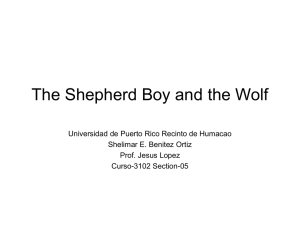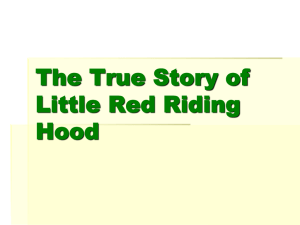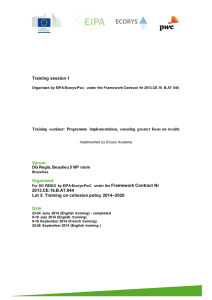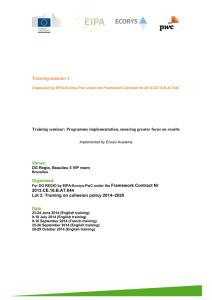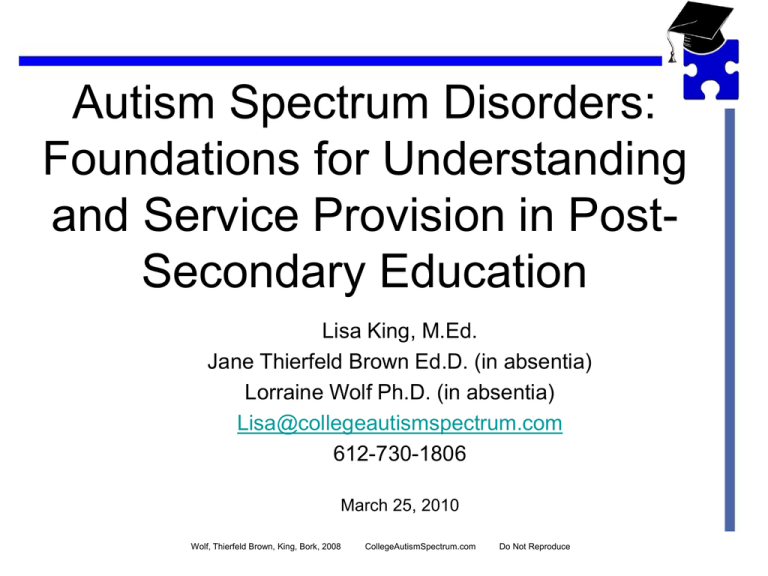
Autism Spectrum Disorders:
Foundations for Understanding
and Service Provision in PostSecondary Education
Lisa King, M.Ed.
Jane Thierfeld Brown Ed.D. (in absentia)
Lorraine Wolf Ph.D. (in absentia)
Lisa@collegeautismspectrum.com
612-730-1806
March 25, 2010
Wolf, Thierfeld Brown, King, Bork, 2008
CollegeAutismSpectrum.com
Do Not Reproduce
Is this your student?……….
They:
• can’t read the entire chapter because it’s “irrelevant”
• score 35 on the ACT’s
• make poor choices: can’t get off the internet long
enough to study
• are fluent in four languages (self-taught)
• can’t turn in the paper because it’s not perfect
• could have written the textbook
• don’t learn from mistakes: take 20 credits each
semester then crash
• find the cure for the common cold
• can’t “repair” or change course after acquiring new
info
• can’t remember to refill or take their meds
• have 150 IQ’s
• get lost on campus on daily basis
Wolf, Thierfeld Brown, King, Bork, 2008
CollegeAutismSpectrum.com
Do Not Reproduce
The Modal AS Student
Male
Logical
Spatially aware
Honest
Detail Oriented
Eye contact issues
Thorough
Independent Thinker
Clumsy
Efficient
Wolf, Thierfeld Brown, King, Bork, 2008
Focused
Lonely or sad
Appears rigid
Disorganized
Sensory aversive
Bright, especially
in areas of interest
Doesn’t see
others point of view
Uses odd phrases
or gestures
CollegeAutismSpectrum.com
Do Not Reproduce
Autism Spectrum Disorders
Umbrella
of Autism Spectrum Disorders is a disability
category of neurological disorders characterized by “severe
and pervasive” impairment in several areas of development.
Significant Impairments in 3 core behavioral features or
indicators…
1.Social interaction
2.Communication
3.Restricted repetitive and stereotyped patterns of
behavior
Wide
range of severity in behavioral and learning profiles
The
borders: Autistic Disorder, Asperger's Disorder,
Childhood Disintegrative Disorder (CDD), Rett's Disorder,
PDD-Not Otherwise Specified (PDD-NOS), others…
Wolf, Thierfeld Brown, King, Bork, 2008
CollegeAutismSpectrum.com
Do Not Reproduce
Aspergers Syndrome
Normal to (way) above average IQ
Mildest end of spectrum
Best prognosis
No language delay (clinical criteria)
Shadow syndromes range into normal
Einstein, Mozart, Gates?
Wolf, Thierfeld Brown, King, Bork, 2008
CollegeAutismSpectrum.com
Do Not Reproduce
Autism Goes to College
Increasing numbers on campus
Not like other college students with disabilities
Accommodations typically needed in social and
executive areas vs academic
Support needed in the extra-academic campus
experience
Environment presents barriers
Wolf, Thierfeld Brown, King, Bork, 2008
CollegeAutismSpectrum.com
Do Not Reproduce
Statistics
Incidence: The number of children in Minnesota diagnosed
with Autism Spectrum Disorders increased 1,291% from
1993 to 2003- Department of Education, 2003
One in 100 is diagnosed with an Autism spectrum or related
disorder-Center for Disease Control, July 2009
Popular press (Wired, Time magazines, Amazing Race, etc.)
DSM IV - Asperger’s Syndrome added as new diagnosis in
1994.
Programs/Services: Gersch Academy, College Living
Experience, MN Life College, Marshall University, etc.
Strategic Education for Asperger’s Students -Thierfeld
Brown and Wolf, 2005
University of Minnesota, UCONN, Storres Campus
Wolf, Thierfeld Brown, King, Bork, 2008
CollegeAutismSpectrum.com
Do Not Reproduce
Incidence or Prevalence?
Why should we pay attention?
Unique gifts and potential for societal impact
Potential to drain time, energy, resources of
institution
Low incidence high maintenance
Paradigm shift: environment is the barrier
Ready or not, here they come!
Wolf, Thierfeld Brown, King, Bork, 2008
CollegeAutismSpectrum.com
Do Not Reproduce
Why Can’t He Get it Together?
Imagine if you processed pieces of the
environment in the order they came in and could
not organize these bits?
Imagine if you screened out many of the bits
because they confused or overwhelmed you?
What if you could not rely on consistency in your
sensory environment?
Imagine if you could not fathom how other people
do it any differently?
What if everyone is expecting or demanding that
you comply with things you don’t understand?
Wolf, Thierfeld Brown, King, Bork, 2008
CollegeAutismSpectrum.com
Do Not Reproduce
What’s it like to think like AS?
Distractible
Unable to “know” what other’s want from me
Concrete – black and white
Highly knowledgeable about certain topics
Excellent memory for things that were said,
seen, heard, from a long time ago – many of
wouldn’t
Remember (pros and cons)
I show little to no care or interest in interest
areas of my friends and family
Problems generalizing across settings
Rule-bound
From Leppicello, Mitch. LICSW
2006
Wolf, Thierfeld
Brown, King, Bork, 2008
CollegeAutismSpectrum.com
Do Not Reproduce
Growing up with AS
Many negative experiences: trauma - big “T”
and little “t”
Bullied, teased, ridiculed by peers, siblings, by
adults: often coaches and teachers
General sense and feeling of being lost and
confused for sometimes decades of their life.
Misdiagnosed and mistreated from mental health
to education; many professionals
For most young adults on the autism spectrum,
depression and anxiety are daily facts of life.
Robin McLeod and Mitch Leppicello for U of M, 2005
Wolf, Thierfeld Brown, King, Bork, 2008
CollegeAutismSpectrum.com
Do Not Reproduce
Co-Morbid Conditions
Remember, depression and anxiety are
daily facts of life.
There are no meds for AS,only help to
manage other symptoms
Behaviors that resemble symptoms of
depression and anxiety may be functioning
as sensory regulation strategies
McLeod, Robin for U of M 2005
Wolf, Thierfeld Brown, King, Bork, 2008
CollegeAutismSpectrum.com
Do Not Reproduce
Oops,
Wrong Planet
Syndrome
Being autistic means that when the
person entered this world, no one gave
him (or her) “the orientation manual for
extraterrestrials!”
Wolf, Thierfeld Brown, King, Bork, 2008
CollegeAutismSpectrum.com
Do Not Reproduce
Neurotypical Disorder (NTD)
Is a neurobiological disorder characterized by
preoccupation with social concerns, delusions
of superiority, and obsession with conformity.
Impairment in independent social interaction
delusional “awareness” of others’ feelings
abnormally seeks comfort from others when distressed
imitates others mindlessly (waves bye-bye)
obsessive rigidity regarding social conformity
phobic avoidance of being different
From: http://isnt.autistics.org/
Wolf, Thierfeld Brown, King, Bork, 2008
CollegeAutismSpectrum.com
Do Not Reproduce
Major Skills Expected from ALL
Beginning College Students
Classroom Preparation:
Study habits/ test taking skills
Self advocate
Organized
Social Skills: Interact according to social norms
Deal with criticism, peer pressure
Use telephone and email effectively
Independent Living Skills:
Locate help when needed
Use leisure time effective
Carry out basic tasks: laundry
Budgeting, managing money
Adapted from
Technology
for Transition:
College
Planning State
Wolf, Thierfeld
Brown, King, Bork, 2008
CollegeAutismSpectrum.com
Do Not Reproduce
Theories of cognitive challenge for AS
Executive functioning (The
Conductor in the orchestra)
Frontal lobe functions:
–
–
–
–
–
–
–
–
Emotional-Regulation
Inhibition of Impulsive Responding
Planning & Organization
Goal Directed Behavior
Attention
Problem Solving
Working Memory
Shifting Set
Theory of Mind
Central Coherence
“Can he PASS the course?
He could have written
the textbook!
But…it doesn’t matter if he can’t get
to class!”
Quote from physics professor, U of M
Wolf, Thierfeld Brown, King, Bork, 2008
CollegeAutismSpectrum.com
Do Not Reproduce
Gaining Admission is
NOT
the issue……………
It’s completing a degree !
Wolf, Thierfeld Brown, King, Bork, 2008
CollegeAutismSpectrum.com
Do Not Reproduce
Typical path of new students with AS:
Special Ed is all done
No more disability
I want to be like everyone else
STRESS
I am overwhelmed
What’s wrong with me
Depression, isolation
CRASH
Cleaning up “the mess”
Lost time, money, resources
maybe irreparable damage…
Then hopefully…….
Maybe I do need support
Wolf, Thierfeld Brown, King Bork, 2008
CollegeAutismSpectrum.com
Do Not Reproduce
Domains affected:
Social
Communication (Language)
Behavior
Other Associated Features:
Motor clumsiness
Perceptual difficulties (visual)
Sensory sensitivities
Organizational and planning deficits
Depression/anxiety
Wolf, Thierfeld Brown, King, Bork, 2008
CollegeAutismSpectrum.com
Do Not Reproduce
Areas of Impact Overlap
Cognitive/Language
Social
Behavioral
Adapted from Bishop, 2001
When you have met one person
with Aspergers……
You have met one person with
AS.
Stephen Shore
Assume that you know very little about the
person’s experience. You cannot guess
what their experience is based on your
experiences of similar situations.
OCALI
Wolf, Thierfeld Brown, King, Bork, 2008
CollegeAutismSpectrum.com
Do Not Reproduce
Where we see the impact:
Academic Matters
Being overwhelmed
Use of the syllabus
Time management issues
Multi-tasking issues
Group work
Initiation issues
The paradox of deadlines
Homework
Taking notes
Perspective taking
Tutoring and issues associated with it
Wolf, Thierfeld Brown, King, Bork, 2008
CollegeAutismSpectrum.com
Do Not Reproduce
Writing Specific Issues
Essay questions
English courses and courses requiring
papers
Writing papers vs. writing “the obvious”
Peer editing
Writing per assignment vs. a novel
Wolf, Thierfeld Brown, King, Bork, 2008
CollegeAutismSpectrum.com
Do Not Reproduce
Where we see the impact:
Behaviors
Interruptions or calling out
Correcting instructor
Out of seat
Sensory integration
Mannerisms or noises
Classmate attitudes or reactions
Meltdowns or outbursts
Wolf, Thierfeld Brown, King, Bork, 2008
CollegeAutismSpectrum.com
Do Not Reproduce
College personnel will likely face:
Behavior issues: odd, offensive, awkward
Social issues: complaints related to interacting
with others
Emotional issues: anger outbursts, meltdowns
Learning issues: not wanting to do homework,
misunderstood assignments
DS and staffs role: reassure faculty
Wolf, Thierfeld Brown, King, Bork, 2008
CollegeAutismSpectrum.com
Do Not Reproduce
An Intellectual Map
Most Behaviors serve a purpose
Find the commonalities in the triggers
Target the behavior
Develop:
accommodation plan
scripts to cope
rules to manage behavior
Wolf, Thierfeld Brown, King, Bork, 2008
CollegeAutismSpectrum.com
Do Not Reproduce
Where we see the impact:
Extra Curricular
Housing and residential life
Social and interpersonal
Navigating the environment
Clubs, joining and involvement
Wolf, Thierfeld Brown, King, Bork, 2008
CollegeAutismSpectrum.com
Do Not Reproduce
Navigating social interactions
Reading facial expressions
Understanding tone of voice
Teasing versus sarcasm
Understanding casual chit-chat
Ending conversations
Round peg in a square hole
Wolf, Thierfeld Brown, King, Bork, 2008
CollegeAutismSpectrum.com
Do Not Reproduce
Research Findings
Social competence is associated with
acceptance by peers, positive self concept and
successful employment
Social skill impairments are most critical for
high functioning students
Once students leave school “situations
requiring social competence tend to far
outnumber those requiring academic skill”
(Canney & Byrne, 2006)
Wolf, Thierfeld Brown, King, Bork, 2008
CollegeAutismSpectrum.com
Do Not Reproduce
ASD and Second Life
Texas researchers believe that
people who have Asperger's
Syndrome may have found a
new therapy in an unlikely
place: the online virtual world
Second Life. As a treatment,
professionals take patients
through a series of exercises, in
groups and individually,
designed to help them learn
social skills. In the center's new
therapy, patients may have a
job interview with a "boss"
character or learn to ask
another avatar out on a date.
http://abcnews.go.com/Technology/OnCall/Story?id=4133184&page=1
STRESS
Typical Stressors at College
• The seat you usually sit in is taken when you get to class.
• You have to look for a different parking spot every day.
• They are out of the foods you eat when you get to the dining
hall.
• The professor has left a note on the classroom door
explaining that class will be held in an alternative building
today.
• You are called upon in class to discuss a reading with a
student next to you.
• The class you are taking is a summer school class but your
college calendar only shows the dates for fall and spring
semester.
• The bookstore does not have the book you need when you
arrive to purchase it.
• Your C.A. tells you there have been complaints about your
hygiene.
Stress & Higher Education
Increase academic demand
Away from home in new environment
Sleep & eating changes
Identity crises
Changed family dynamic
Financial burdens
Social changes
New people, ideas, expectations
Alcohol & drugs
Sexual identity
Prepare for postgraduate life, career uncertain
copyright Wolf, Thierfeld Brown,
2009
Wolf, Thierfeld Brown, King, Bork, 2008 Bork
CollegeAutismSpectrum.com
Adapted from NIMH 1997
Do Not Reproduce
NEW + Change = STRESS!!!
Lack
of clarity
Being
misunderstood
Social
situations
Confusion/chaos
Unstructured
Having
time
to rush
Change/novelty
Having
things not go the
way you wanted
Wolf, Thierfeld Brown, King, Bork, 2008
CollegeAutismSpectrum.com
Do Not Reproduce
The Incredible 5 Point Scale
Social narrative that teaches a student
about :
• How to manage Stress
• Determine appropriate social
Behaviors
** See A 5 is Against the Law
Author: Kari Dunn Buron
Wolf, Thierfeld Brown, King, Bork, 2008
CollegeAutismSpectrum.com
Do Not Reproduce
Kari Dunn Buron’s books
Sensory Integration Dysfunction
Lights
Music
General dorm or noise
Fire alarms
Touch
Behaviors/causes/misinterpretation
Wolf, Thierfeld Brown, King, Bork, 2008
CollegeAutismSpectrum.com
Do Not Reproduce
Sensory
Area
Calming
Activities
Alerting Activities
Tactile
Wear soft clothing like sweat
pants.
Squeeze resistive putty
Wear ankle weights or
weighted vest
Handle fidget items
Hold something cold
Wash face with cool cloth
Light touch to the palm of the hand
Proprioceptive
Push heavy object
Push a heavy cart
Carry boxes
Vacuum the floor
Deliver office mail, papers.
Exercise
Pick up trash in hall ways
Vestibular
Rock in a rocking chair
Gustatory
Chew, suck on a pen top,
necklace, hard candy.
Suck liquids through a
straw.
Drink warm liquids
Eat crunchy foods-pretzels, ice, carrots, celery,
apple.
Eat chewy food-licorice, taffy, gum.
Keep water bottle with cold water on desk
Olfactory
Write with a scented pen or
marker.
Smell potpourri, scented
candle.
Use scented lotion or soap
Spray a citrus room deodorizer
Auditory
Listen to quiet music with
slow, even beat.
Listen to soft singing or
humming.
Work in a quiet environment
Use headphones to block
noise.
Prepare in advance for loud, strange noises
(startle).
Listen to music with varied pitch, loudness
or uneven beat.
Speak in animated high and low voice.
Visual
Work in dim light or with no
lights.
Work at distraction free desk.
Work in natural light.
Work in bright light.
Use colored paper.
Use highlighter.
Adapted from Simple Strategies That Work! p. 18-19.
www.asperger.net
Behavior
Cause
Head on desk
(mis)Interpretation
Sensory overload
Rude, sleeping
Mimics or recites back Time to process
Not taking speaker
seriously
Great expressive skills Compensates for
receptive skills
Overestimation of
functioning
Odd speaking habits
Pragmatic Language
deficits
Inappropriate
May not respond to
facial expressions,
tone
Difficulty with
non-verbals
Leads to miscues in
assignments
Does not recognize
you
Limited facial
recognition
Aloof, rude
May not shift topic on
cue
Does not
Self-absorbed,
automatically catch on uninterested
HYPER or HYPO
Too Much or too Little?
Sensory issue/ possible strategies
Think in terms of “replacing” rather than
“extinguishing”for inappropriate behaviors
Examples: Chewing gum vs. constant nose-blowing
Carpet swatch under desk vs. picking at skin
Doodling on paper vs. head down during
lecture
Sprig of rosemary vs. smelling armpit
Wolf, Thierfeld Brown, King, Bork, 2008
CollegeAutismSpectrum.com
Do Not Reproduce
Advice for Support Staff:
Lose the counselor hat “how do you feel?”
Develop rapport first: find the “hook”
Use visuals: maps, write things down
Use formulas: “if….then…..”
Dry humor, wit
Remember: PTSD ( hx of little “t’s” through life)
Consider mentors
Use “rules”
Wolf, Thierfeld Brown, King Bork, 2008
CollegeAutismSpectrum.com
Do Not Reproduce
Working with the family
Like father, like son
Great memory for all that’s gone wrong (hx of
little “t’s”)
Unreasonable requests
To parents, “services” = “program”
Helicopter…?
Time on front end = insurance
Write things down
Clarify roles
Have agendas for meetings
Use same strategies you use for student
Wolf, Thierfeld Brown, King Bork, 2008
CollegeAutismSpectrum.com
Do Not Reproduce
Transition issues:
The newness of your campus
Size and Culture
Navigating campus
Unfamiliar terms: “Registrar’s Office and
Bursar’s Office
Campus expectations: students managing their
own business as adults
Schedules different from what the students are
accustomed to having
Syllabus: importance and use of to manage
one’s time
Wolf, Thierfeld Brown, King Bork, 2008
CollegeAutismSpectrum.com
Do Not Reproduce
The importance of
building Trust
Get into the world of student : Find the
hook!
Increase awareness of strengths before
addressing deficits
Link skills to the students goals
Use of assigned readings: AquaMarine
Blue #5
Wolf, Thierfeld Brown, King, Bork, 2008
CollegeAutismSpectrum.com
Do Not Reproduce
Generate options for dealing with
stressful situations (emphasize options
and effective)
Encourage a willingness to ask for help
(“The smartest people ask for help”)
Increase the skill of identifying who can
be helpful in different situations
Wolf, Thierfeld Brown, King, Bork, 2008
CollegeAutismSpectrum.com
Do Not Reproduce
Tools for the student
Provide student with DS “handbook”
Maps
Contact info: profs, T.A.s, DS, health
center, writing center, etc.
Campus spending account
Grade tracking forms
Calendar (time management)
Organization training
Ann Palmer, parent of AS, TEAACH
Wolf, Thierfeld Brown, King, Bork, 2008
CollegeAutismSpectrum.com
Do Not Reproduce
Advice for Support Staff:
Lose the counselor hat “how do you
feel?”
Develop rapport first: find the “hook”
Use visuals: maps, write things down
Use formulas: “if….then…..”
Dry humor, wit
Remember: PTSD ( hx of little “t’s”
through life)
Wolf, Thierfeld Brown, King Bork, 2008
CollegeAutismSpectrum.com
Do Not Reproduce
An Intellectual Map
Most Behaviors serve a purpose
Find the commonalities in the
triggers
Target the behavior
Develop:
accommodation plan
scripts to cope
Wolf, Thierfeld Brown, King, Bork, 2008
CollegeAutismSpectrum.com
Do Not Reproduce
Developing Scripts
Learning to be a good advocate
Teaching negotiating strategies
Working with others for problem
solving
Employment on campus?
Working with peers
Members of the opposite sex
Getting started in organizations
Wolf, Thierfeld Brown, King, Bork, 2008
CollegeAutismSpectrum.com
Do Not Reproduce
SCRIPTS for solving problems
Classroom Problems
THE SITUATION OR ISSUE:
My lab partner does not show up
and I have to do the lab alone.
STEP ONE:
Identify problem
Anxiety and distraction due to
unexpected change in routine.
STEP TWO:
Dete rmine Solutions
1. Ask to leave class for a few
minutes to calm down
2. Use relaxation techniques
3. Talk to TA or professor to
determine options
4. Join another group
STEP THREE:
Who can help
1. Myself / Self-help
2. Professor or TA
College Autism Spectrum 3/09
Wolf, Thierfeld Brown, King, Bork, 2008
CollegeAutismSpectrum.com
Do Not Reproduce
In theory…
• Academic difficulties in AS directly
related to deficits in integration,
executive dysfunction, and selfregulation
• If we understand why, we can figure
out when and how to best
accommodate
Wolf, Thierfeld Brown, King, Bork, 2008
CollegeAutismSpectrum.com
Do Not Reproduce
Support for Student
Help make the unfamiliar more familiar
Pictures
Maps
Repeated visits
Familiar routines in new places
Wolf, Thierfeld Brown, King, Bork, 2008
CollegeAutismSpectrum.com
Do Not Reproduce
Clear Behavioral Requirements
Behavioral standards & expectations must be
explicit
Student & family need to understand because
this is different from high school
Standards are not subject to accommodation
Make sure student understands the rules and
the consequences for breaking them
Written communication!
Wolf, Thierfeld Brown, King, Bork, 2008
CollegeAutismSpectrum.com
Do Not Reproduce
Good Night!
Do 5-10 minutes of cleaning (start in
bathroom)
Lock doors
Take medication
Fill pill case. If you need refill, put in palm
pilot
Put socks in washer
Hang clothes if dryer is full
Check Palm for tomorrow's schedule
Brush teeth
Do you need to use the bathroom?
Put glasses on the bathroom counter
Go to bed! Zzzzz....
Wolf, Thierfeld Brown, King, Bork, 2008
CollegeAutismSpectrum.com
Do Not Reproduce
Importance of Structure
Organization:
have a clear beginning and end
Predictability, Structure, and Routine can
never be under-estimated
Visual Supports are helpful, regardless of
how many times one is verbally given the
message or asked a question
Wolf, Thierfeld Brown, King, Bork, 2008
CollegeAutismSpectrum.com
Do Not Reproduce
Learning to use a Schedule
Wolf, Thierfeld Brown, King, Bork, 2008
CollegeAutismSpectrum.com
Do Not Reproduce
Clocks or Timers
can help with
waiting ….if events
occur at a
predictable time
Resource Notebook
Financial information: spending account, bank
account numbers, bank location and phone
number, etc.
Employer information: rules, breaks
information
Important contacts: job coach, instructors,
mentor, etc.
Social options- list of free time activities, club
and organization information, info on
upcoming social events
Medical info: doctor’s contacts, meds, dosage
Wolf, Thierfeld Brown, King, Bork, 2008
CollegeAutismSpectrum.com
Do Not Reproduce
Developing Scripts
Learning to be a good advocate
Teaching negotiating strategies
Working with faculty for problem
solving
Employment on campus?
Working with peers
Members of the opposite sex
Getting started in organizations
Wolf, Thierfeld Brown, King, Bork, 2008
CollegeAutismSpectrum.com
Do Not Reproduce
Policies and Procedures
Know and use the student conduct code
Create rules sheet
Create social/ res life reminders
BE SPECIFIC and concrete
Scripts: Fire Drills, lock downs
Wolf, Thierfeld Brown, King, Bork, 2008
CollegeAutismSpectrum.com
Do Not Reproduce
When working with students with AS, remember:
Consistency, Structure and Predictability
Honor who they are; prioritize challenges based
on impact on life/job or course
Use special interests or fascinations whenever
possible; find their “hook”
Visuals remain constant, words do not
What’s obvious to you is not to AS, explain
Adapted from Dorothy Lucci, MGH/YouthCare, 05.
Wolf, Thierfeld Brown, King, Bork, 2008
CollegeAutismSpectrum.com
Do Not Reproduce
When working with students with AS, remember:
If you have met one person with AS, you have
met one person with AS
Be clear and direct in communication: say what
you mean; mean what you say
Provide big picture and details: why are we
doing what we are doing
Don’t assume what’s in your head is in theirs:
check it out
Adapted from Dorothy Lucci, MGH/YouthCare, 05.
Wolf, Thierfeld Brown, King, Bork, 2008
CollegeAutismSpectrum.com
Do Not Reproduce
Questions and Comments
Thank you for coming.
Lisa King, M.Ed.
Higher Education and Autism Spectrum
Disorders, Inc.
612-730-1806
Lisaking.ASHE@comcast.net
www.CollegewAutismSpectrum.com
Wolf, Thierfeld Brown, King, Bork, 2008
CollegeAutismSpectrum.com
Do Not Reproduce

